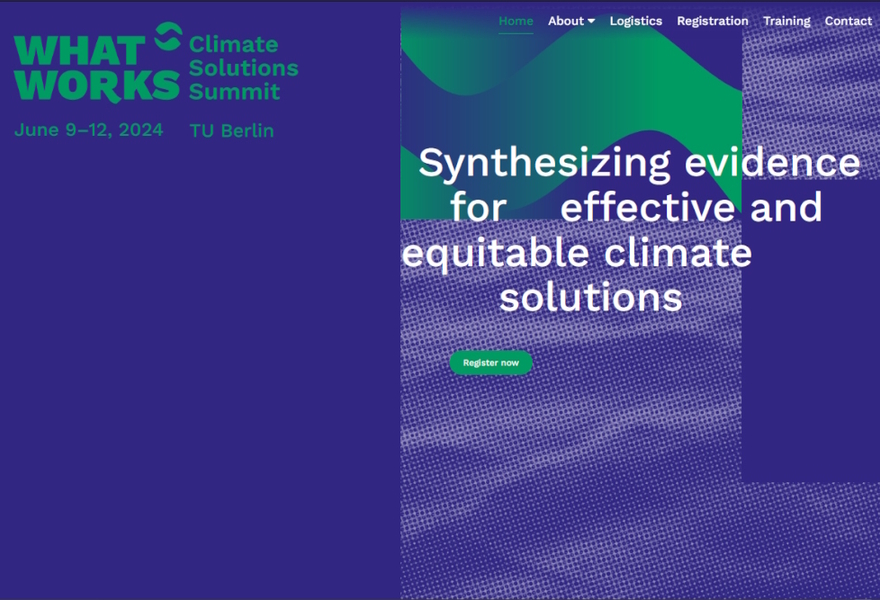Conference 9–12 June: how can research contribute to good climate policy?
MCC-hosted event “What Works Climate Solutions Summit” will be a great opportunity for scientific exchange, policy dialogue, and networking.
With little room for error and delay in delivering climate solutions, it is critical that we generate knowledge through rigorous evidence synthesis. The aim is to understand which climate policies work, under what conditions, why, and for whom. The hybrid MCC-hosted event
What Works Climate Solutions Summit
9–12 June 2024
Technische Universität Berlin & virtually via video stream
is a high-level conference for evidence-based climate policy. The event aims to promote and catalyse synthetic evidence on climate solutions for climate policy assessments (such as the IPCC’s 7th Assessment Report, the annual UNEP Emissions Gap Report and the Lancet Countdown on health and climate change) as well as other forms of scientific policy advice.
The summit brings together leading experts on climate solutions, key institutions curating scientific policy advice on the climate crisis (such as science assessment bodies and science academies), evidence synthesis communities (the Campbell Collaboration, Cochrane, Collaboration for Environmental Evidence, Evidence Synthesis International, the Evidence-Based Research Network) as well as policymakers, research funders, and other stakeholders and users of evidence. We aim to make progress on three major goals:
- Advance and catalyse rigorous, transdisciplinary evidence synthesis work, and climate policy evaluation across the scientific community, involving all relevant stakeholders, to support upcoming assessment reports.
- Build evidence synthesis capacity.
- Form new collaborations and communicate the need for change.
Keynote speakers will include Jim Skea (Chairman of the IPCC, and Professor at Imperial College London), Rohini Pande (Professor at Yale University, and The Abdul Latif Jameel Poverty Action Lab), Julian Elliott (Co-Founder and CEO Future Evidence Foundation; Alliance for Living Evidence (ALIVE), and Professor at Cochrane Australia), Winston Chow (IPCC Co-Chair Working Group II on Impacts, Adaptation and Vulnerabilities, and Professor at Singapore Management University), Samantha Cheng (Director of Conservation Evidence, WWF), Cheikh Mbow (Director General Centre de Suivi Ecologique), Marina Romanello (Executive Director of the Lancet Countdown, and Professor at University College London) as well as a contribution by the SDG Synthesis Coalition.
We are grateful to our international partner network: Technische Universität Berlin, The Campbell Collaboration, Evidence Synthesis International, 3ie, Cochrane, London School of Hygiene and Tropical Medicine, the Pan-African Collective for Evidence (PACE), The Evidence-Based Research Network, Collaboration for Environmental Evidence, Global Commission on Evidence and the El-Erian Institute at the University of Cambridge. We are further grateful to our co-sponsors: the Wellcome Trust, the German Ministry for Education and Research (BMBF) as well as the International Development Research Centre (IDRC).
Free trainings are offered following the event on 13–14 June at the same venue. The purpose of the workshop is to assist you in developing a systematic review protocol for a topic of your interest. You will receive free, state-of-the-art training in evidence synthesis methodologies from leading international experts from the Campbell Collaboration and related organisations: Ruth Garside (University of Exeter), Jan Minx (MCC), Hugh Sharma Waddington (LSHTM), Wolfgang Viechtbauer (Maastricht University), and more. Trainings will cover a broad range of qualitative, quantitative and mixed-methods systematic review as well as systematic mapping/ evidence gap mapping methodologies.
Further information:
- WWCS website: https://whatworksclimate.solutions/
- Apply for training: https://whatworksclimate.solutions/training/






